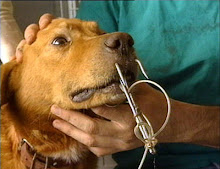Friday, July 8, 2011
Could The HER2 Treatment By Advaxis Be The One For Canine Osteosarcoma
UPenn Initiates Canine Osteosarcoma Study With Advaxis HER2
Advaxis, Inc. (OTCBB: ADXS), a leader in developing the next generation of immunotherapies for cancer and infectious diseases, announces that the first dog has entered a dose-ranging in canine osteosarcoma at the University of Pennsylvania School of Veterinary Medicine.
Canine Osteosarcoma is a cancer of long (leg) bones that is a leading killer of large dogs over the age of 10 years. Standard treatment is amputation immediately after diagnosis, followed by chemotherapy. Invariably, however, the cancer metastasizes to the lungs. With chemotherapy, dogs survive about 18 months compared to 6-12 months, without treatment. The HER2 antigen is believed to be present in up to 50% of osteosarcoma. ADXS-HER2 creates an immune attack on cells expressing this antigen and has been developed to treat human breast cancer. The Company plans to file an IND later this year for this indication.
In 2010, Advaxis contracted with the University of Pennsylvania School of Veterinary Medicine to conduct a canine clinical program to determine the safety and efficacy of ADXS-HER2 in osteosarcoma. Positive results may lead to research in humans, as well.
"There is an especially high unmet need for safe, effective and reasonably priced cancer therapy in the companion animal market," commented Thomas A Moore, Chairman and CEO of Advaxis, Inc. "This early study gets us started."
About the Canine Osteosarcoma Trial
The study will be under the direction of Dr. Nicola Mason, an assistant professor at the University of Pennsylvania School of Veterinary Medicine. Only dogs with a histological diagnosis of osteosarcoma and evidence of expression of HER2/neu by malignant cells will be eligible for enrollment.
All dogs will receive 4 weeks of carboplatin therapy. Four weeks after the last carboplatin dose, dogs will receive ADXS-HER2 once every three weeks for a total of 3 doses. Group 1 (3 dogs) will receive 1x108 CFU per dose, Group 2 (3 dogs) will each receive 5x108 CFU per dose and Group 3 (3 dogs) will receive 1x109 CFU per dose. Additional dogs may be added to a Group to gather more data should if a potentially dose limiting toxicities, be observed. Therefore 9-18 dogs may be treated in the initial study.
Source:
University of Pennsylvania School of Veterinary Medicine
Advaxis Incorporated
Subscribe to:
Post Comments (Atom)

















No comments:
Post a Comment